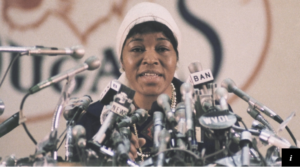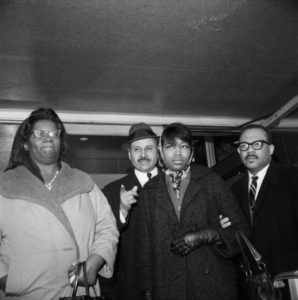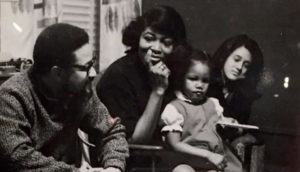 My mother witnessed the martyrdom of her husband on February 21, 1965. I was at the Audubon Ballroom with her and my sisters, Attallah and Qubilah, when my father was to deliver an address on his new federation, the Organization of Afro American Unity. At the time mom was pregnant with my twin sisters, Malikah and Malaak; Gamilah just a few months old was home with the Wallace Family (where we were staying because our home had just been firebombed. The Wallace’s are family to Ossie Davis and Ruby Dee).
My mother witnessed the martyrdom of her husband on February 21, 1965. I was at the Audubon Ballroom with her and my sisters, Attallah and Qubilah, when my father was to deliver an address on his new federation, the Organization of Afro American Unity. At the time mom was pregnant with my twin sisters, Malikah and Malaak; Gamilah just a few months old was home with the Wallace Family (where we were staying because our home had just been firebombed. The Wallace’s are family to Ossie Davis and Ruby Dee).
“My most vivid memory of Betty is that she was first and foremost a woman who cherished her family. A wife and mother, she was extremely protective of her children. Mothers instinctively protect those they love, even more so in the face of danger. And, when you are the wife of a civil rights activist whose philosophy is perceived equally by blacks and whites as caustic, you become the shield that wards off the evil spears of hatred. You place yourself in harm’s way.”
-MYRLIE EVERS-WILLIAMS
 I have no clear recollection of the thunderous and horrific shooting of my father that day because I was just under three years old. I am told that our mother literally shielded my sisters and me from the gunfire with her body before attempting to save her husband’s life with mouth-to-mouth resuscitation.
I have no clear recollection of the thunderous and horrific shooting of my father that day because I was just under three years old. I am told that our mother literally shielded my sisters and me from the gunfire with her body before attempting to save her husband’s life with mouth-to-mouth resuscitation.
Just a week prior to her husband’s assassination, their home was firebombed; the bomb was thrown into the nursery where their four baby girls slept: Attallah, Qubilah, me, and Gamilah (ages 6, 4, 2, and 6 months old respectively). All to say, in a matter of days, my mother’s life would change forever. She was left alone—homeless penniless—widowed, a single parent of four babies and pregnant with twins. She was the wife of a man who challenged a government that had been historically unjust.
She was harassed by the Nation of Islam (NOI), the Federal Bureau of Investigation (FBI), the Central Intelligence Agency (CIA), and so on. Nevertheless, my mother persevered through all of the adversity because she possessed faith in God, respect for self, an awareness of history, most especially Africa’s contribution to world history; and a perspective that never permitted her to say, “No, I can’t do this,” as an answer.
My mother refused to live her life as a victim. And as a result, she soared. All the while, giving of herself to any and every one she met. She often said to me, “Ilyasah, just as one must drink water; one must give back.” And that she did. Dr. Betty Shabazz was an incredibly courageous woman who would become a great social leader and champion of social justice in her own right. And, she was determined to ensure that my sisters and I would benefit from a culturally rich and diverse upbringing.
My mother was born Betty Dean Sanders in Pinehurst, Georgia. She eventually moved to Detroit, Michigan where she attended high school and joined the Delta Sigma Theta Sprites. She was a member of an African Methodist Episcopal (AME) Church, and worked at her father’s shoe repair store. After high school, Tuskegee Institute is not located in Birmingham AL. It is located in Tuskegee AL, Macon County.The alma mater of both her parents. My mother relocated to New York because she refused to tolerate the intense racism she encountered in the south. Soon after her arrival in New York, mother enrolled as a student at the Brooklyn State Hospital School of Nursing. While pursuing her nursing school studies, my mother was invited by a friend to attend a Nation of Islam meeting. There she heard a young, dynamic speaker named Malcolm X. You know the story: After the speech, they discussed the racism she encountered in Alabama, and she began to understand its causes, pervasiveness, and effects. Soon, she would be attending all of my father’s lectures. (smile)
Shortly after, Mom graduated from nursing school. Dad called her from a telephone booth and proposed to her. They were married within one week. Their relationship was a true example of partnership, undying love, devotion, and mutual respect.Naturally, after my father’s transition, most of what I learned about him and his teachings were communicated through my mother. She was bound and determined to serve as an educator and role model, and to raise us six girls on her own who would all (including me) pay tribute to their heritage. Mom was also determined to be a good provider to her daughters. We attended private schools, summer camp in Vermont with Quaker and Native American values, music lessons, dance lessons, and tutorials in Islam and the history of the African Diaspora—to say the very least.
 Despite the challenge of raising six girls, Mom earned a Nursing Degree, a Bachelor of Arts in Public Health and Education from Jersey City State College, a Master of Arts in Public Health Education from Jersey City State College and a Ph.D. in Education Administration from the University of Massachusetts at Amherst.
Despite the challenge of raising six girls, Mom earned a Nursing Degree, a Bachelor of Arts in Public Health and Education from Jersey City State College, a Master of Arts in Public Health Education from Jersey City State College and a Ph.D. in Education Administration from the University of Massachusetts at Amherst.
In 1976, Mom joined New York’s Medgar Evers College as an assistant professor. She taught health sciences and then became head of public relations as well as serving as its Cultural Attache’. Dr. Shabazz participated on various United States delegations with Presidents Ford, Carter, and Clinton. She also participated in the Women’s International Conference in Bejing, China, and continued to travel internationally in the cause of social justice. She was an outspoken advocate for human rights, women’s rights, racial tolerance, and the goal of self-determination and self-reliance for the Diaspora.
My mother passed away in 1997. Her Janazah was attended by such luminaries as Myrlie Evers, Coretta Scott King, Maya Angelou, U.S. Representative Maxine Waters, and so many, many others. (Fittingly, her devotion to health issues was recognized when in 1997, the Brooklyn Community Healthcare Network (CHN) dedicated the Betty Shabazz Health Center in her honor. Medgar Evers College and the New York State Legislature also honored Mom with endowment of the Dr. Betty Shabazz Social Justice Chair; each year the occupant, Dr. Andree McLaughlin convenes “The Shabazz Conversations” to pay tribute to my mother and other deserving honorees of vision and courage.
Before her transition, Dr. Betty Shabazz established the Malcolm X Medical Scholarship program for outstanding students attending Columbia University—where the recipient must commit to provide medical service to the underserved for at least one year. Subsequently, Columbia University established the Betty Shabazz Nursing Scholarship program. My mother was relentless in convincing the United States Government to honor her husband with a postage stamp of his image. (However, Iran honored Dad first with a postage stamp.) Dr. Shabazz also formed a coalition of community, political, and educational leaders to establish the Malcolm X Memorial Center (MXM) at the Audubon to honor her husband’s legacy. After her transition, we re-conceived The Malcolm X & Dr. Betty Shabazz Memorial and Educational Center.
My goal is to empower future generations through understanding the world’s diverse cultures and historic civilizations.
Site Navigation
Contact Info
Copyright 2022 © Ilyasah Shabazz Enterprises | Privacy Policy | Terms of Use | Sitemap | Website & Marketing by: POWERFUL IMPACT

